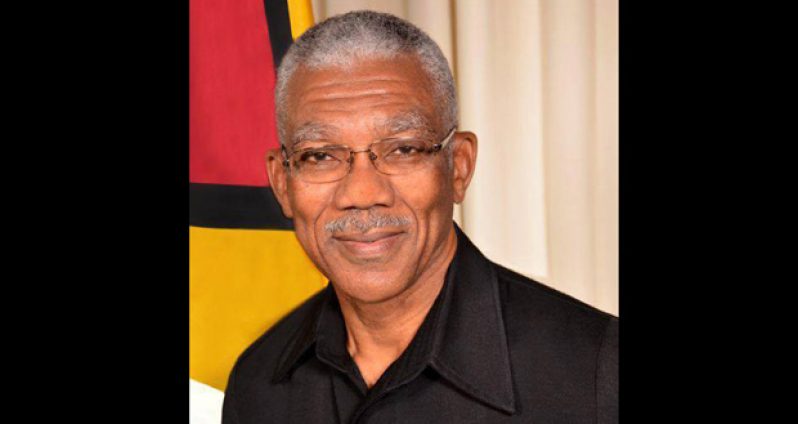– President Granger
By Ariana Gordon
THE Integrity Commission is likely to become fully functional by the end of this year, President David Granger has said. The President disclosed that government is in the process of creating functional laws and organizational structure to enable the Integrity Commission to function effectively in discharging its mandate.
During recording of the Ministry of the Presidency’s weekly televised programme “the Public Interest”, the President told reporters that which was inherited from the former People’s Progressive Party (PPP) administration is “unworkable.”
Though he could not provide a specific timeline as to when the Integrity Commission would become functional, the President said there has to be the “tightening” of the legislation to ensure that those who are found guilty of committing illegal acts while in public office are prosecuted.
“We are working on the legislation; it will be brought to cabinet, and I expect that before the end of this year there will be a functioning Integrity Commission,” said President Granger.
The President told reporters that, under the previous administration, the Integrity Commission was a “poorly funded, poorly administered [and] dysfunctional organisation.”
“We are going to create functional laws — functional organisation structure — and I expect that by the end of this year, when Parliament resumes in October, we’d be able to bring that legislation before the National Assembly. Give us time,” he admonished.
President Granger likened the functioning of the Integrity Commission in the past to that of a post office, where persons submitted their returns but no action was taken.
“There was a perception that the PPP was using the Integrity Commission as a means, rather than (of) preventing corruption, of checking people’s personal finances,” said the President.
Asked whether he sees an overlapping of responsibilities or functions between the Integrity Commission and the Special Organised Crime Unit (SOCU), the Head of State said he does not. He explained that the functions of the two entities are entirely different, in that the Integrity Commission is a constitutional body that requires certain categories of public officers to submit returns. At a policy making level and level of officialdom, it is meant to oversee the behaviour of public officials mainly.
SOCU’s role, on the other hand, he explained, is much wider and is largely associated with money laundering. “It deals with the banking system, commercial transactions, [and] other officers from different companies or corporations. There are two different levels; anybody can be reported to SOCU who is accused of money laundering…but that would not be the business of the Integrity Commission.”
The Integrity Commission Act was assented to on the 24th September 1997. It provides for the establishment of the Integrity Commission, and makes provisions for the purpose of securing the integrity of persons in public life.
The Act also provides for the appointment of a Chairman to head the Commission, not less than two (2) and not more than four (4) other members of the Commission, a Secretary to oversee the day-to-day work of the Commission, and other officers for the proper functioning of the Commission.
The Chairman should be a person who is or was qualified to be a Puisne Judge of the High Court, or any other fit and proper person; and the other members should appear to the President as having experience and showing capacity in law, public administration, social service, finance or accountancy or any other discipline.
The Chairman and other members are appointed by the President after consultation with the opposition.
Public Officers and positions listed under Schedule 1 of the Commission’s Act should disclose their financial assets and liabilities on or before June 30, each year. When a public officer ceases to be a person in public life, he or she should disclose his or her assets and liabilities to the Commission within thirty days from the date that individual cease to be a person in public life, the legislation states.
In the past, the functioning of the Integrity Commission has been a controversial issue, though the previous administration had sworn in members in 1999, the Commission’s Chairman, Bishop Randolph George, resigned in 2006, and the commission has since been headless.
While in Opposition, the APNU-AFC coalition had promised to appoint an independent Integrity Commission as a matter of priority. It vowed that the Chairman and members of the Commission would be persons of good repute.



.jpg)








